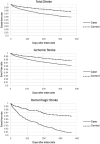Increased risk of depression and associated symptoms in poststroke aphasia
- PMID: 39266657
- PMCID: PMC11393353
- DOI: 10.1038/s41598-024-72742-z
Increased risk of depression and associated symptoms in poststroke aphasia
Abstract
Poststroke aphasia hinders patients' emotional processing and social adaptation. This study estimated the risks of depression and related symptoms in patients developing or not developing aphasia after various types of stroke. Using data from the US Collaborative Network within the TriNetX Diamond Network, we conducted a retrospective cohort study of adults experiencing their first stroke between 2013 and 2022. Diagnoses were confirmed using corresponding International Classification of Diseases, Tenth Revision, Clinical Modification codes. Patients were stratified by poststroke aphasia status and stroke type, with propensity score matching performed to control for confounders. The primary outcome was depression within one year post-stroke; secondary outcomes included anxiety, fatigue, agitation, emotional impact, and insomnia. Each matched group comprised 12,333 patients. The risk of depression was significantly higher in patients with poststroke aphasia (hazard ratio: 1.728; 95% CI 1.464-2.038; p < 0.001), especially those with post-hemorrhagic-stroke aphasia (hazard ratio: 2.321; 95% CI 1.814-2.970; p < 0.001). Patients with poststroke aphasia also had higher risks of fatigue, agitation, and emotional impact. Anxiety and insomnia risks were higher in those with post-hemorrhagic-stroke aphasia. Poststroke aphasia, particularly post-hemorrhagic-stroke aphasia, may increase the risks of depression and associated symptoms, indicating the need for comprehensive psychiatric assessments.
Keywords: Anxiety; Aphasia; Depression; Hemorrhagic stroke; Stroke.
© 2024. The Author(s).
Conflict of interest statement
The authors declare no competing interests.
Figures




Similar articles
-
Poststroke depression and its multifactorial nature: results from a prospective longitudinal study.J Neurol Sci. 2014 Dec 15;347(1-2):159-66. doi: 10.1016/j.jns.2014.09.038. Epub 2014 Oct 2. J Neurol Sci. 2014. PMID: 25451004
-
Screening Poststroke Fatigue; Feasibility and Validation of an Instrument for the Screening of Poststroke Fatigue throughout the Rehabilitation Process.J Stroke Cerebrovasc Dis. 2016 Jan;25(1):188-96. doi: 10.1016/j.jstrokecerebrovasdis.2015.09.015. J Stroke Cerebrovasc Dis. 2016. PMID: 26777554
-
The effect of aphasia upon personality traits, depression and anxiety among stroke patients.J Affect Disord. 2015 Feb 1;172:312-4. doi: 10.1016/j.jad.2014.10.027. Epub 2014 Oct 22. J Affect Disord. 2015. PMID: 25451431
-
Accessibility and Applicability of Currently Available e-Mental Health Programs for Depression for People With Poststroke Aphasia: Scoping Review.J Med Internet Res. 2018 Dec 4;20(12):e291. doi: 10.2196/jmir.9864. J Med Internet Res. 2018. PMID: 30514696 Free PMC article.
-
[Depression, anxiety and other emotional symptoms after cerebral stroke].Tidsskr Nor Laegeforen. 2007 May 17;127(10):1387-9. Tidsskr Nor Laegeforen. 2007. PMID: 17519996 Review. Norwegian.
Cited by
-
Neurobiological Relationships Between Neurodevelopmental Disorders and Mood Disorders.Brain Sci. 2025 Mar 14;15(3):307. doi: 10.3390/brainsci15030307. Brain Sci. 2025. PMID: 40149827 Free PMC article. Review.
-
Effect of three rehabilitation methods combined with transcranial electromagnetic stimulation on post-stroke aphasia: a RCT network meta-analysis.Front Neurol. 2025 May 27;16:1600065. doi: 10.3389/fneur.2025.1600065. eCollection 2025. Front Neurol. 2025. PMID: 40496125 Free PMC article.
-
Analysis of the Incidence and Influencing Factors of Depression in the Acute Stage of Ischemic Stroke: A Retrospective Clinical Study.Brain Behav. 2025 Apr;15(4):e70483. doi: 10.1002/brb3.70483. Brain Behav. 2025. PMID: 40259715 Free PMC article.
-
Propranolol as a Novel Therapeutic Approach for Post-Stroke Anxiety: A Clinical Review and Future Directions.Cureus. 2024 Dec 25;16(12):e76381. doi: 10.7759/cureus.76381. eCollection 2024 Dec. Cureus. 2024. PMID: 39867038 Free PMC article. Review.
-
[A study on electroencephalogram characteristics of depression in patients with aphasia based on resting state and emotional Stroop task].Sheng Wu Yi Xue Gong Cheng Xue Za Zhi. 2025 Jun 25;42(3):488-495. doi: 10.7507/1001-5515.202503034. Sheng Wu Yi Xue Gong Cheng Xue Za Zhi. 2025. PMID: 40566770 Free PMC article. Chinese.
References
MeSH terms
Grants and funding
LinkOut - more resources
Full Text Sources
Medical

